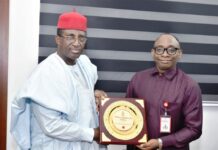
The Federal Government has said that the cassava Bio-ethanol value chain development project would bring about higher growth in Gross Domestic Product (GDP) and significantly reduce unemployment by creating meaningful opportunities for the youth in Nigeria.
The Permanent Secretary, Budget and National Planning, Engineer Nebeolisa Anako made this known in Asaba, Delta State, during the South-South Zonal Awareness/Sensitization workshop on strategic Implementation of the Bio-ethanol value chain Development Project.
Represented by the Director of Economic Growth in the Ministry, Mrs. Elizabeth Egharevba, the Permanent Secretary said “the Bio-economy Policy aims at promoting sustainable economic growth and development by creating a Bio-based economy that will contribute to the job creation, poverty reduction, and increased access to food and energy. This will be achieved through the development of the cassava Bio-economy, as well as other Bio-resources”.
“The country, at this time, needs an approach that will increase food production, youth employment, and increased growth through the provision of industrial feedstock and exportable products to boost our economy and to achieve this, one strategic pathway is to develop the Cassava Bio-ethanol Value Chain”. He noted.
Engineer Anako said, the sensitization workshop was to develop the modalities for the implementation of the Cassava Bio-ethanol project as well as identify the key stakeholders required for the implementation of the entire value chain. “It is also envisaged that this workshop will help to publicise this project to stakeholders for their buy-in and participation”.
He added that the development of the Cassava Bio-ethanol value chain was a veritable pathway to assuage the economic impacts on citizens and for sustained development given the recent removal of subsidy on Petroleum products, re-evaluation of the Naira through the merging of official and non-official exchange windows.
Anako commended stakeholders from relevant Ministries, Departments and Agencies (MDAs) for their collaboration and enduring partnership thus far, in developing the Bio-economy Policy which was a Ministerial deliverable that was captured in the National Development Plan (NDP) 2021 – 2025.
“This framework will employ a Triple-Helix Knowledge Transfer Partnership in its implementation. This includes the Academia, Research and Development Institutes, Farmers, the Private Sector and Government MDAs as well as the Civil Society, Development Partners and Development Finance Institutions”.
According to him, the Cassava Bio-ethanol Value Chain was to demonstrate the efficacy of private sector-led approach in promoting investment in renewable Biomass, create wealth, provide jobs, reduce poverty, and improve food security and nutrition, as well as, improved environmental management.
In his remarks, the Governor of Delta State, Rt. Hon. Sheriff Francis Oborevwori, stated that the Cassava Bio-ethanol Value Chain development would immensely benefit a greater population of state.
The Governor who was represented by the Commissioner for Agriculture, Dr. Ben Agamah, said the initiative would encourage more indigenes of the state to invest much in cassava farming to reduce the pressure on government in creating jobs.
Also speaking, Professor Olumuyiwa Jayeoba of the Association of Deans of Agriculture in Nigeria Universities (ADAN), said the Association was determined to coordinate and implement the pilot phase of the project and that they had a structure that allowed for full implementation of the project, including bio-entrepreneurship and curriculum development.
The project consultant, Prof. Ken Ife, in his remarks said there was a need to engage universities with a view to producing young bio-entrepreneurs and extension service agents to boost agricultural productivity as well as food availability across the country.




